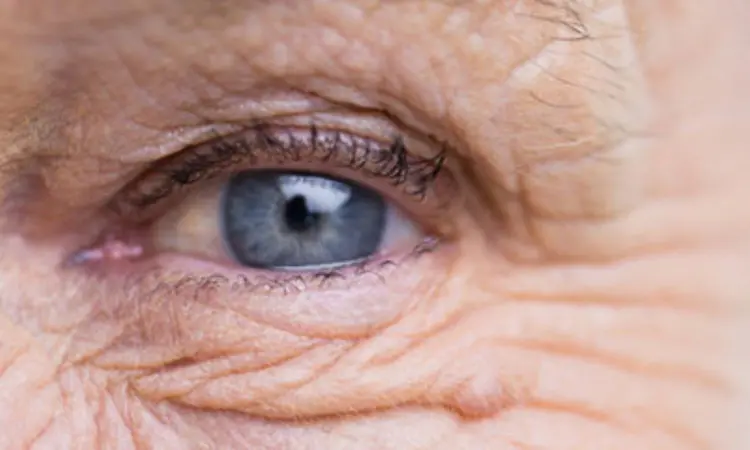- Home
- Medical news & Guidelines
- Anesthesiology
- Cardiology and CTVS
- Critical Care
- Dentistry
- Dermatology
- Diabetes and Endocrinology
- ENT
- Gastroenterology
- Medicine
- Nephrology
- Neurology
- Obstretics-Gynaecology
- Oncology
- Ophthalmology
- Orthopaedics
- Pediatrics-Neonatology
- Psychiatry
- Pulmonology
- Radiology
- Surgery
- Urology
- Laboratory Medicine
- Diet
- Nursing
- Paramedical
- Physiotherapy
- Health news
- Fact Check
- Bone Health Fact Check
- Brain Health Fact Check
- Cancer Related Fact Check
- Child Care Fact Check
- Dental and oral health fact check
- Diabetes and metabolic health fact check
- Diet and Nutrition Fact Check
- Eye and ENT Care Fact Check
- Fitness fact check
- Gut health fact check
- Heart health fact check
- Kidney health fact check
- Medical education fact check
- Men's health fact check
- Respiratory fact check
- Skin and hair care fact check
- Vaccine and Immunization fact check
- Women's health fact check
- AYUSH
- State News
- Andaman and Nicobar Islands
- Andhra Pradesh
- Arunachal Pradesh
- Assam
- Bihar
- Chandigarh
- Chattisgarh
- Dadra and Nagar Haveli
- Daman and Diu
- Delhi
- Goa
- Gujarat
- Haryana
- Himachal Pradesh
- Jammu & Kashmir
- Jharkhand
- Karnataka
- Kerala
- Ladakh
- Lakshadweep
- Madhya Pradesh
- Maharashtra
- Manipur
- Meghalaya
- Mizoram
- Nagaland
- Odisha
- Puducherry
- Punjab
- Rajasthan
- Sikkim
- Tamil Nadu
- Telangana
- Tripura
- Uttar Pradesh
- Uttrakhand
- West Bengal
- Medical Education
- Industry
Intravitreal Pegcetacoplan for Age-Related Macular Degeneration Linked to "Floaters" Due to Silicone Oil Droplets

Intravitreal pegcetacoplan (Syfovre) injections, recently approved for dry age-related macular degeneration, linked to "floaters." These floaters result from presumed intravitreal silicone oil droplets. This association was discovered in a retrospective record review from a retinal health clinic. This study was published in JAMA Ophthalmology.
In a study conducted by Dr. Amr Dessouki and colleagues at the Retinal Diagnostic Center in California, 16 out of 55 patients treated with intravitreal pegcetacoplan developed presumed intravitreal silicone droplets 2 to 4 weeks after treatment. Among these patients, 14 experienced new floaters that were described as persistent, while two were asymptomatic. No patients showed signs of inflammation, infection, or a decline in visual acuity.
Floaters can be bothersome and may require surgical treatment to address. Although they are not debilitating, they can be an annoyance to patients. This is not the first instance of silicone oil droplets appearing following intravitreal injections. Similar reports were made in 2017 after the use of intravitreal bevacizumab (Avastin), a drug used to treat wet age-related macular degeneration.
A 2018 survey of American retinal surgeons found that 5% of respondents had performed vitrectomy surgery for symptomatic silicone oil, and 2% had patients who sought legal action. Intravitreal pegcetacoplan was approved by the FDA earlier this year for the treatment of geographic atrophy associated with nonexudative age-related macular degeneration. While it does not reverse vision loss, it slows down further deterioration.
In this study, researchers suspect that the medication is interacting with the syringe during administration, resulting in the formation of oil droplets. This interaction may occur when the syringe is used to remove air bubbles. Silicone oil is used to lubricate the inner wall of the syringe, which can contribute to the problem.
To address this issue, researchers suggest using silicone-free syringes, although these are difficult to find. Another solution could involve prepacking the medication in syringes to minimise the need for pushing and pulling, which generates oil droplets.
Intravitreal pegcetacoplan injections, a promising treatment for age-related macular degeneration, have been associated with the development of floaters due to presumed intravitreal silicone oil droplets. The interaction between the medication and the syringe may be the primary cause of this issue. Physicians are urged to exercise caution when using this medication and to inform patients about this uncommon side effect.
Reference:
Dessouki, A., He, L., Park, K., Chen, H., & Chow, C. C. Presumed silicone oil droplets after intravitreal pegcetacoplan injections. JAMA Ophthalmology,2023. https://doi.org/10.1001/jamaophthalmol.2023.4326
Dr Riya Dave has completed dentistry from Gujarat University in 2022. She is a dentist and accomplished medical and scientific writer known for her commitment to bridging the gap between clinical expertise and accessible healthcare information. She has been actively involved in writing blogs related to health and wellness.
Dr Kamal Kant Kohli-MBBS, DTCD- a chest specialist with more than 30 years of practice and a flair for writing clinical articles, Dr Kamal Kant Kohli joined Medical Dialogues as a Chief Editor of Medical News. Besides writing articles, as an editor, he proofreads and verifies all the medical content published on Medical Dialogues including those coming from journals, studies,medical conferences,guidelines etc. Email: drkohli@medicaldialogues.in. Contact no. 011-43720751


